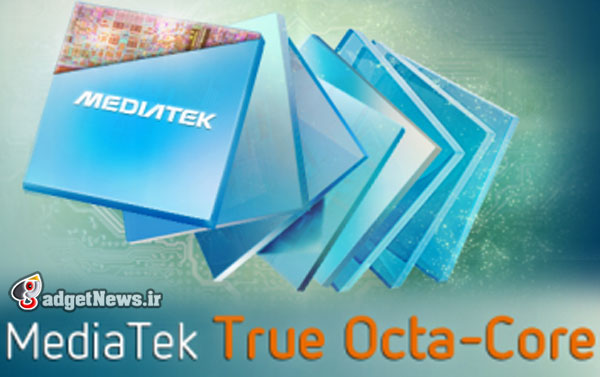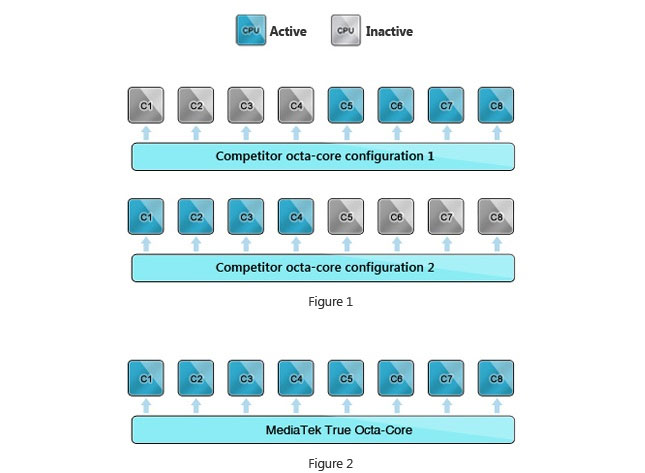
پس از معرفی چیپ Snapdragon S805 توسط کوالکام، مدیاتک از پردازندهی MT6592 پرده برداشت و براساس ادعای این شرکت، این محصول اولین پردازندهی هشت هستهای در بین پلتفرمهای تلفنهای هوشمند است.
بهنظر میرسد علاوه بر امکانات و ویژگیهای این پردازنده که بر اساس ادعای مدیاتک شامل کارایی بالا در اجرای بازیها، تعادل میزان فعالیت آن با مصرف انرژی و بهینهسازی مصرف انرژی است، این محصول یک پردازندهی ویژه است، چراکه مدیاتک پردازندهی هشت هستهای 5420 اگزینوس سامسونگ را در نظر نگرفته و محصول خود را با عنوان اولین پردازندهی هشت هستهای معرفی نموده است.
MT6592 براساس لیتوگرافی 28 نانومتری ساخت HPM تولید شده که استفاده از فرکانس حداکثری 2 گیگاهرتزی را برای هر هسته ممکن ساخته است. همچنین MT6592 دارای واحد گرافیک چهارهستهای ARM Mali-450MP با فرکانس کاری 700مگاهرتزی است. مدیاتک مدعی است که پردازندهی گرافیکی محصول جدید خود قادر به پخش ویدئوهایی با کیفیت 4k*2k H.264 بوده و همچنین ویدئوهایی با کدک H.265 و VP9 را پشتیبانی میکند. از دیگر ویژگیهای جالب این چیپ میتوان به فناوری ClearMotion اشاره کرد که قادر است بصورت خودکار فریمریت ویدئوها را از 24 یا 30 فریم بر ثانیه به 60 فریمبرثانیه تبدیل کند که منجر به پخش روانتر ویدئو می شود.

در حقیقت مدیاتک با کنترل و بهرهگیری از توان پردازشی هر هشت هسته، کار بزرگی را انجام داده است. سامسونگ نیز در پردازندهی 5420 اگزینوش خود اینکار را انجام داده است، اما بهنظر میرسد مدیاتک با کسب تجربه از ضعفهای اگزینوس، سعی کرده است تا چیپ خود را بهینه طراحی کند. مدیاتک برای هستههای پردازشی از Cortex-A7 استفاده کرده و آنها را با استفاده از چینش big.LITTLE کنار هم قرار داده است. اما بهنظر میرسد معماری استفاده شده در این چیپ، big.LITTLE نباشد، چراکه این نوع چینش برای هستههای ناهمگون استفاده میشود. برای مثال برای چینش هستههای قویتر در کنار هستههای ضعیفتر از این چینش تبعیت میشود. ازاینرو بهنظر میرسد چینش استفاده شده نوعی از مدل little.LITTLE باشد. در این مدل، مدیاتک از الگوریتم برنامهریزی خود برای کنترل دما و مصرف انرژی هستهها استفاده کرده تا مصرف انرژی بهینهتری را بهدست آورد.
نظر شما در این موردچیست؟ چرا مدیاتک با وجود چیپ هشت هستهای اگزینوس، محصول خود را با نام اولین معرفی کرده است؟
منبع : androidauthority
MediaTek tries to pretend that the Exynos 5420 doesn’t exist as it launches world’s first true octa-core processor
In a brazen attempt to look better than its competition, MediaTek has unveiled the MT6592, a processor which it is claiming is the world’s first true octa-core mobile platform. Ignoring all the fluff in the release information like “premium gaming performance” and “perfect balance of performance and power consumption” the MT6592 does look like a rather special processor, all I object to is MediaTek’s insistence that the Samsung Exynos 5420 doesn’t exist!
The eight-core MT6592 is built using 28nm HPM manufacturing process which has allowed MediaTek to ramp up the clock to 2 GHz per core. The MT6592 features what MediaTek are calling a “world-class multimedia subsystem with a quad-core graphics engine,” which is actually just an ARM Mali-450 MP GPU clocked at 700 MHz. However, MediaTek says it can handle 4Kx2K H.264 video playback and includes support for new video codecs such as H.265 and VP9. Interestingly the SOC also features MediaTek’s ClearMotion technology that automaticaly does frame-rate conversion for 24 or 30 fps video to 60fps video for smoother playback.
MediaTek are making a big thing of the fact that this processor has eight-cores and that the MT6592 can harness the full capabilities of all eight cores in any combination. Something which the Exynos 5420 can do as well, but MediaTek seems to have overlooked that.
For the cores MediaTek has opted to use eight Cortex-A7 cores arranged in a big.LITTLE configuration. Which doesn’t make much sense as big.LITTLE is meant to be for a true Heterogeneous Multi-Processing design where some of the cores are faster (i.e. Cortex-A15 cores) than others. It seems that MediaTek has arranged the eight cores in a kind of little.LITTLE arrangement. In this arrangement MediaTek is using its own scheduling algorithm that also monitors temperature and power consumption to ensure optimum performance at all times.
The company says we should expect devices running Android 4.2 Jelly Bean by the end of 2013 and Android 4.4 Kit-Kat based devices are expected in early 2014.
What do you think? Is the MT6592 a brilliant new design? Why does the company ignore the Exynos 5420?
 گجت نیوز آخرین اخبار تکنولوژی، علم و خودرو
گجت نیوز آخرین اخبار تکنولوژی، علم و خودرو 




